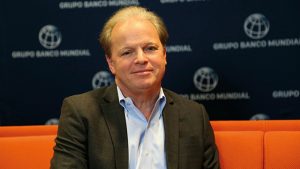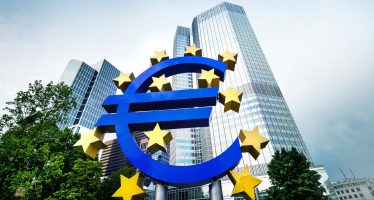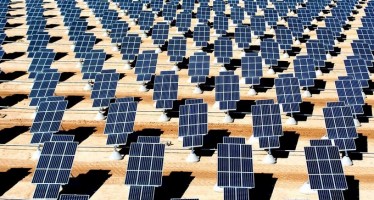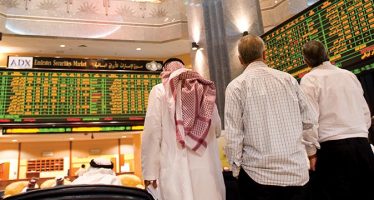World Bank on COVID-19: The Road Back Must Be Green, Resilient, and Inclusive
By Axel van Trotsenburg World Bank Managing Director of Operations

World Bank Managing Director of Operations: Axel van Trotsenburg
COVID-19 has imposed a deeper, more widespread shock than the global community has faced in many decades. The pandemic is causing illness and death, disrupting livelihoods, and potentially pushing an estimated 150 million more people into extreme poverty by the end of 2021. And while the rapid development of vaccines offers all of us some hope, the pandemic continues to dominate our lives.
For developing countries, COVID is also compounding the risks posed by climate change, along with other long-term challenges. In many places, fragility and conflict were eroding development gains long before the pandemic. Far too many countries were also coping with unsustainable debt levels. And every country was facing challenges to create more jobs in a global economy marked by accelerating technological change.
Taken together, these factors mean that most developing economies were highly vulnerable when COVID struck. And they are now the ones suffering the greatest damage from its impacts. Given the pressing nature of these challenges—notably climate change—countries don’t have the luxury of putting off action on other crises and risks until the pandemic subsides.
This means that the financing needs in low- and middle-income countries are at a historic high. While industrialised countries have spent up to 15–20% of their GDPs on stimulus packages, emerging markets have spent around 6% and the poorest countries have spent less than 2%. To help developing countries at the scale they need will require substantial new resources, from the World Bank Group and other multilaterals, from the donor community, and from the private sector. Sustained, robust financial support for the poorest countries is critical to boosting their capacity to beat the pandemic, build more resilient economies, and restore momentum on the 2030 agenda.
The World Bank Group is committed to helping close this financing gap. Our COVID crisis response over the past year has been fast and decisive in bringing massive support to developing countries, particularly the poorest and most vulnerable. Across the World Bank, IFC, and MIGA, we have stepped up to this challenge since the onset of the pandemic. World Bank programs, normally in the range of $42 billion per year, grew last calendar year to $71 billion to meet intensified client demand. About 60 percent of our operations are currently COVID-related.
We are also starting a year early on the negotiations for the next replenishment of the International Development Association (IDA), our fund for the poorest. IDA has been a steadfast and increasingly important source of support for the poorest countries through various crises, and it has stepped up even more during the pandemic. This is especially evident in our support for health, education, and social protection.
In addition to increasing the provision of large concessional resources to the poorest countries, as IDA is doing, debt relief has been a key part of the support package. The G20 Debt Service Suspension Initiative (DSSI) has helped free up resources for governments, which they have been able to direct to priority areas for combatting the pandemic. But there are still challenges, particularly with private creditors, who have not been participating actively in this important initiative. And while the DSSI has provided essential short-term relief, many of the poorer countries also face longer-term concerns on debt sustainability. The G20 Common Framework, about to begin, should help address these problems on a case-by-case basis.
While debt relief and concessional resources from multilateral organisations and donors are critically important, more needs to be done. Tackling this global crisis effectively can happen only with more international solidarity and more international action. With the pandemic affecting every country simultaneously, there’s a risk that wealthier countries will focus mainly on their own COVID-19 recovery. While this is perhaps understandable, as every government is accountable to its own people, it runs the risk of leaving poorer countries behind. This ultimately jeopardises the well-being of all.
The COVID vaccines illustrate this risk very clearly. We are working closely with many other organisations to get the vaccines to the people of developing countries. The World Bank is providing up to $12 billion to governments and the IFC a further $4 billion to manufacturers of vaccines and related equipment in developing countries. Efforts include using COVAX, a mechanism that the international community has set up to ensure global, equitable access to vaccines for major infectious diseases. But at this early stage, the industrialised countries have bought up most of the supply of the COVID vaccines, leaving developing countries with insufficient coverage. Therefore, it is very important to ensure fast and equitable distribution of vaccines worldwide.
But beyond these immediate concerns, the pandemic has wider impacts that could affect developing countries for the long term. Continued, sustained financing will be critical to ensure a lasting recovery but rebuilding better will also mean embracing key shifts that are transforming the global economy. COVID-19 has already spurred changes in how people work and live, and in how economies are organised. The crisis is underscoring the value of robust health, education, and social protection systems. It is making clearer than ever that digital access and innovation can support every sector of the economy. And it highlights the need for effective government and community leadership.
This is why we need to start focusing our support, both financial and technical, on the green, resilient, and inclusive transformations that will help economies withstand a range of potential shocks in the future. While the emergency phase is far from over, we must partner with countries now, not just to anticipate health risks, but also to help them brace against climate change, natural disasters, conflict, and economic disruption.
The World Bank Group believes that countries can chart a new, sustainable route to higher living standards by pursuing their climate and environmental goals. Their recovery from the pandemic is a chance to accelerate this progress and rebuild better. Hence, we are preparing to support developing countries on a much larger scale as they invest in green infrastructure, develop environmentally sustainable technologies, and phase out harmful fuel subsidies. The goals of long-term growth and job creation are inextricable from countries’ efforts to reduce carbon emissions and to mitigate and adapt to climate change.
As they plan for the road ahead, developing countries will also need policies and reforms that expand economic participation, that leverage technology for more robust and inclusive delivery of key services, and that make it easier for the public and private sectors to work together toward development goals.
By focusing on key climate investments, countries can not only unlock short-term gains in growth but also deliver long-term benefits: lower carbon emissions, greater resilience to climate change, and more good jobs in emerging, greener sectors.
The international community stands at a critical moment, with COVID-19 and climate change imposing dual crises of global proportions. Both require a massive global response, and they must be tackled simultaneously. Meeting investment objectives will call for significant financial resources at a time when countries are facing fiscal constraints and debt overhang, and there is a need to augment all sources of finance – including from the private sector, domestic resources, and development financing – and use it effectively.
Developing countries have been the most vulnerable in this pandemic, just as they are to climate impacts. And they face the steepest path back. The World Bank Group is working hard to help them secure the financial resources and sustained international support needed. We are all in this together, and I remain optimistic that we will see real improvement in many countries during 2021.
About the Author
Axel van Trotsenburg is the World Bank Managing Director of Operations.
In this role, which he assumed on October 1, 2019, van Trotsenburg oversees the Bank’s operational program and ensures that the Bank’s delivery model continues to meet the needs of client countries. He also builds support and mobilises financial resources across the international community for efforts to assist low and middle-income countries.
Van Trotsenburg brings deep experience in regional operations and finance, drawing on his experience as currently the longest serving Vice President at the Bank, with two tenures in the Finance Complex and two in Operations. A Dutch and Austrian national, he was Acting World Bank CEO from September 2 – 30, 2019 and served as World Bank Vice President for Latin America and the Caribbean from February 2019. In this latter position, he led relations with 31 countries in the region and oversaw a portfolio of ongoing projects, technical assistance and grants worth more than US$30 billion.
From 2016 to January 2019, van Trotsenburg served as World Bank Vice President of Development Finance (DFi). Here, he oversaw strategic mobilisation of resources, and was responsible for the replenishment and stewardship of the International Development Association (IDA), the largest source of concessional financing for the world’s poorest countries. He has led the policy negotiations and process for two IDA replenishments, which together mobilised a record $125 billion—$50 billion in 2010 for IDA16 and $75 billion in 2016 for IDA18. Under his leadership, for the first time, IDA leveraged its equity by blending donor contributions with internal resources and funds raised through debt markets.
In his DFi role, van Trotsenburg also oversaw the International Bank for Reconstruction and Development (IBRD) corporate finances. He co-led the World Bank Group’s efforts to obtain a capital increase which resulted in shareholders endorsing a transformative package in April 2018, including an increase of the IBRD capital by $60 billion. He also co-chaired the replenishment negotiations for the Global Environment Facility (GEF) that were successfully concluded in April 2018 and was responsible of a multi-billion-dollar trust fund portfolio.
Prior to joining the World Bank, van Trotsenburg worked at the OECD in Paris. He holds a master’s and a doctorate degree in economics and a master’s degree in international affairs. He is married and has two children.
World Bank: COVID-19 Response
The World Bank, one of the largest sources of funding and knowledge for developing countries, is taking broad, fast action to help developing countries respond to the health, social and economic impacts of COVID-19. This includes $12 billion to help low- and middle-income countries purchase and distribute COVID-19 vaccines, tests, and treatments, and strengthen vaccination systems. The financing builds on the broader World Bank Group COVID-19 response, which is helping more than 100 countries strengthen health systems, support the poorest households, and create supportive conditions to maintain livelihoods and jobs for those hit hardest.
You may have an interest in also reading…
Market Volatility as Push (Slowly) Comes to Shove: Grappling with a Multitude of Crises in an Increasingly Dangerous World
Central bankers seem caught between their natural inclination to get a grip on inflation and a fear of abruptly deflating
The Renewable Electricity Grid: The Future Is Now
New World Bank report finds that with the right policies and investments, countries can integrate high levels of variable renewable
Abu Dhabi Securities Exchange (ADX): At the Heart of Vision 2030
The Abu Dhabi Securities Exchange (ADX) was established in 2000 as a legal entity with autonomous status, independent finance, and


















































































